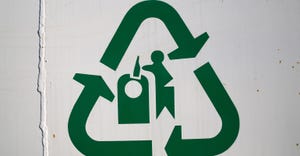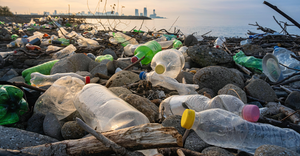IN PITTSBURGH, failing to recycle could mean a resident has to forfeit more than just the affection of environmentally conscious friends and neighbors. It could require handing over a sizeable chunk of cash.
Seeking to boost compliance with its mandatory recycling law, the city has begun issuing fines to chronic non-recyclers. Roughly 100 fines have been handed out to residents since the city began cracking down on poor recyclers about three months ago, according to Bill Klimovich, operations manager in the Public Works Department's Bureau of Environmental Services. A first-time fine for residents carries a $62.50 price tag. A second offense could cost as much as $500. However, no residents have been issued a second fine, city officials say.
For businesses and other non-residential properties such as institutions, the first-time fine for not recycling is $1,000, and a second fine could reach $5,000, Klimovich says. No such properties have been fined since the start of the crackdown.
Under state law, Pittsburgh has the authority to fine residents and entities that violate the recycling law. In the past, the city preferred to boost recycling rates through public education efforts, Klimovich says. But just because the city is getting tougher on non recyclers, that doesn't mean that it is handing out citations without first giving the violators a chance to change their ways, he adds.
For example, before it issues a resident a fine, when city garbage and recycling crews discover that a resident is not separating recyclables from the rest of his garbage, workers leave a notice on the resident's door, and a letter is later sent to his home explaining the offense, Klimovich says. If the resident then still doesn't comply with the law, then a fine is issued. Some businesses have been issued warnings that have been heeded.
“Our goal is not to issue citations but to encourage our residents to recycle because it's the law, and landfill space is very limited,” Klimovich says. “The more residents recycle, the better off we will be.”
Besides reducing pressure on landfills, Pittsburgh has some financial incentives to recycle. Vendors pay the city roughly $30 per ton for newspapers, and about $11 per ton for plastics, glass containers and aluminum cans. On the other hand, it costs the city a tipping fee of $19.28 per ton to dispose of garbage in a landfill, Klimovich says.
A 1988 state law made recycling mandatory in Pennsylvania's larger cities. Over the years, the law has been expanded to include smaller communities. About 55 percent of the city's households recycle, says Leonard Huggins, program supervisor in the Bureau of Environmental Services. To encourage more recycling, “it's come to the point where we need to be a little more aggressive, and that's why we have stepped up the enforcement,” he says of the fines.
Pittsburgh collects garbage and recyclables from residential properties with five living units or less. The city can, however, fine other types of properties for violations of city refuse regulations.
It is unclear how many other cities across the nation fine residents for not recycling. According to The Associated Press, the U.S. Environmental Protection Agency (EPA), Washington, D.C., does not keep a list of cities that do.
About the Author(s)
You May Also Like




